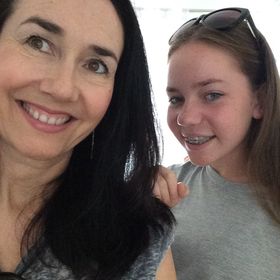
Yolanda was diagnosed with DCIS and is currently participating in the TROG 07.01 ‘DCIS’ trial, which is in the follow-up stage. This is her story.
At 46, l was the happiest and fittest l had ever been.
One ordinary day, a single phone call shifted that path in the road, its impact like thick asphalt splitting a highway after an earthquake. I had been diagnosed with DCIS. My mother had died of secondary breast cancer in her fifties. It was easy for me to mentally relive the emotional aftershock of nursing her palliatively at home. I knew well the potential course this disease could take, and even though my own diagnosis was DCIS, my mind immediately flew fast-forward to imagining myself hovering above my own funeral, watching my beautiful children stunned in grief. Silly, l know, but this was the only association l knew. I had joined an exclusive club, where no one is truly grateful for membership. My treatment was to be a fast-moving process of opening and closing doors, cold cotton gowns and year-old magazines in waiting rooms. Yielding to the team of professionals proved to be the most efficient and sensible manner to deal with the surgery and treatment, although there were still decisions to make. These decisions, like whether or not to take regular hormone treatment, felt like rolling dice on the game of my life. It was “up to me to have a think about” what course l would take.
I was insistent my sensitive primary school-aged children should not know the diagnosis. I created an Excel spreadsheet engaging my family to help with pickups from school: this allowed me to attend my daily radiation treatment without them knowing. It was hard acting as though nothing was happening, but in many ways, it forced me to retain domestic ‘normality’.
My decision to be a contributor to clinical trials was based on future cures for the people l love, my family and friends. It seemed irresponsible to decline this opportunity to confirm or negate treatment for a future cure that will come. I was lucky in that Peter Mac was ten minutes from my home. I knew of country patients who travelled by bus, or required drivers to make their daily appointment.
I chose the shortest straw in the trial radiation duration – the longest possible hits. For 35 long spring days, l rewarded myself with a skinny mocha from the hospital café – each day moving closer to the end. The whir and alarms of the radiation machines will be imprinted in my brain, and the formidable sheer tonnage of machinery suspended delicately above my body will never be forgotten. The final weeks of radiation were tough, as my skin was affected by burns. I found myself weeping in despair. Please let it end sooner – by some absolute miracle. On the positive side, the pure sorbelene cream l used during this time is still my friend. (It is wonderful for the skin!)
As profound as the experience was, l now find myself with an overwhelming sense of fearlessness and power. l believe l am living better, seeing far more beauty, and expressing myself more authentically.
The diagnosis l most worried about since my mother died, l have tackled – hopefully for the last time.
I would love to start a support group for women going through the same experience. I would have adored a cup of tea, a real chat and a biscuit with similar patients in the not- so- exclusive “club”. I still drop in piles of new magazines for the waiting rooms, for new patients, hoping this may improve the experience just a little. I continue to visit Peter Mac for regular trial surveys and appointments.
On my final radiation session, one of the fabulous radiographers said, “l don’t mean this the way it sounds, but l hope we never, ever see you again.” The feeling is mutual!
TROG Cancer Research is a registered charity in Australia, holding the Deductible Gift Recipient (DGR) status, which means that donations over $2 are tax-deductible.
For over 30 years, Trans-Tasman Radiation Oncology Group has been dedicated to improving the way radiation medicine is delivered to cancer patients with ongoing scientific research, clinical trials, and cutting-edge technology.
Latest News
Keep up to date with TROG news, subscribe to our community newsletter.
ABN: 45 132 672 292